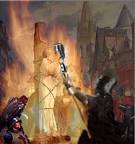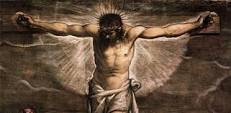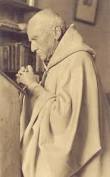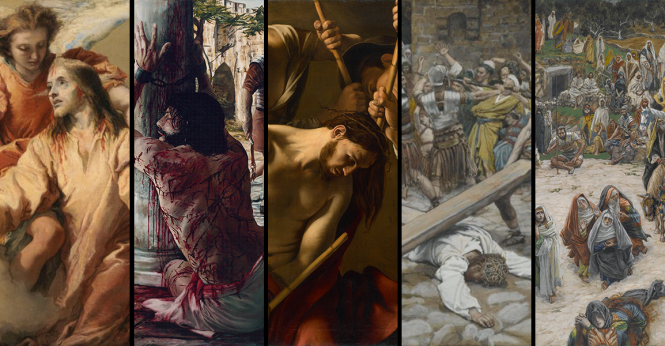The way in which they are to conduct themselves in this night of sense is to devote themselves not at all to reasoning and meditation, since this is not the time for it, but to allow the soul to remain in peace and quietness, although it may seem clear to them that they are doing nothing and are wasting their time, and although it may appear to them that it is because of their weakness that they have no desire in that state to think of anything. The truth is that they will be doing quite sufficient if they have patience and persevere in prayer without making any effort. What they must do is merely to leave the soul free and disencumbered and at rest from all knowledge and thought, troubling not themselves, in that state, about what they shall think or meditate upon, but contenting themselves with merely a peaceful and loving attentiveness toward God, and in being without anxiety, without the ability and without desired to have experience of Him or to perceive Him. For all these yearnings disquiet and distract the soul from the peaceful quiet and sweet ease of contemplation which is here granted to it. –St John of the Cross “Dark Night of the Soul”
St John of the Cross stresses doing nothing during times of spiritual strife, in times of darkening the senses, abandoning attachment to one’s life amidst the world. Settling into a peaceful, even if it is a struggle to achieve, state of mind, is the appropriate action for the contemplative. Preparing the vessel for filling—all that can be done, nothing is to be done, in faith, hope, and charity awaiting Divine Will. When reason and discursive meditation are void of meaning, doing nothing is the proper path. No other action suffices. Honest, open, and willing, I place myself in the presence of God.
Being still.
Cleverness ceasing.
Brokenness dominating.
Healing ensuing.
I wait upon God.
The past has proven that when worldly conditions overwhelm, I lose my ability to persevere in prayer. The dryness I can take. It is the tumult of life that knocks me off my path. I do not cope well with worldly matters. A faithful friend, the lawyer whose Christmas party I attended, called me a ‘practical atheist’. I had a deep love for God, the ability to consume myself with God, yet I never believed God was active in my life. I was convinced my life was doomed. Suffering, even if it was self-imposed, was my spiritual path. Loving God was no problem. Carrying my cross was the burden too difficult to endure. The world is my battleground; the contemplative life my love. It must not be an escape or insane, rather everything focused upon its furthering. Leading a normal quiet life, I repose hidden in contemplation.
During these times of adversity in life, I find myself trending toward doing nothing, simply seeking the presence of God through stillness—a Rosary recited and in hand. Once complete, I like to wrap the beads around my left Hand, caressing the cross with my right, sitting in the aftermath of worshiping Our Holy Mother. A physicality existing between my Rosary and my senses. Opening myself to love, silently pleading for understanding and strength, confessing weakness and ignorance. The saints have endured much greater difficulties forced upon them by worldly conditions and persevered. St Maximillian Kolbe and Edith Stein prime examples.
I recall reading a biography of Joan of Arc. During her trial, her prosecutors despised her. The intelligent, highly educated, worldly men in favor of England took the matter of convicting Joan of heresy personal, determined to have her executed and denounced. They made it their mission in life to crush everything Joan was. During the early stages of her public trial, Joan maintained her strength, her conviction of being aligned with Divine Will shining through. Her answers were penetratingly clever, displaying fortitude and confidence—a woman aligned, fearing, and loving God, while respecting and under obedience to the Church. The prosecutors advanced their diabolical methods to interrogating Joan in her cell. They denied her words from being heard by others. None would witness her ways. Starved, sleep deprived, confined to a tiny inhospitable space, chained while harassingly interrogated by her hateful accusers, she began to break.
“…confused and exhausted; although she remained adamant on the essential points of her life, her work, and her visions, she was no longer the calm and confident girl of the open court. Her replies were now frequently vague, often contradictory, sometimes extravagant…Malnourishment, lack of sleep, constant anxiety and physical confinement were taking a dreadful tool on her stamina”.
I garner great inspiration from Joan at this time of lacking. Awaiting burning at the stake, I am positive it is when she pushed herself into sainthood. The woman of God endured horrible suffering, losing her capabilities and clever retorts, unable to defend herself, completely overwhelmed by her attackers. She never lost hope. Her dignity and love of God remained unscathed, focused acutely.
It is accepted knowledge that the most painful of deaths is to burn to death. In France, executioners were known to secretly cut the throat of one to be burned. Such was not the case for Joan. Kindness was extended by an executioner who fashioned a cross out sticks from the pyre. Joan clung to the cross as she was exhumed, ascending directly to heaven for dying a martyr’s death.

Our Lord during his crucifixion pleading the beginning of Psalm 22: “My God, my God, why hast thou forsaken me?” There are many interpretations and thoughts regarding this monumental moment in the salvation of mankind. I will present one offered to me by the priest founding and leading the Franciscan friary I was involved with. He stressed that at the time the Psalms were not numbered. There was no famous Psalm 23. The Psalms of David were introduced by their first line. What the Lord was doing while dying on the cross in sacrifice for the sins of all men and women was pointing to a particular Psalm. It is the ending of the Psalm that is essential, not the beginning. Let’s examine the words. They are words of victory, not abandonment.
All the ends of the earth shall remember
and turn to the LORD;
and all the families of the nations
shall worship before him.
For dominion belongs to the LORD,
and he rules over the nations.
The Lord did nothing at the time salvation for mankind was earned. He endured death on a cross. He accepted His suffering, ultimate victory the consequence. The quote yesterday from Abbot Vital Lehodey touched on perfect love. Advancing the reading, he moves into the true test of that love as the acquiescing to suffering. Through suffering, submitting, conceding to the will of God, perfect love, the union of wills, grace abounds. The lovers become one, producing graces beyond their shared love.

Crucifixion







Recent Comments